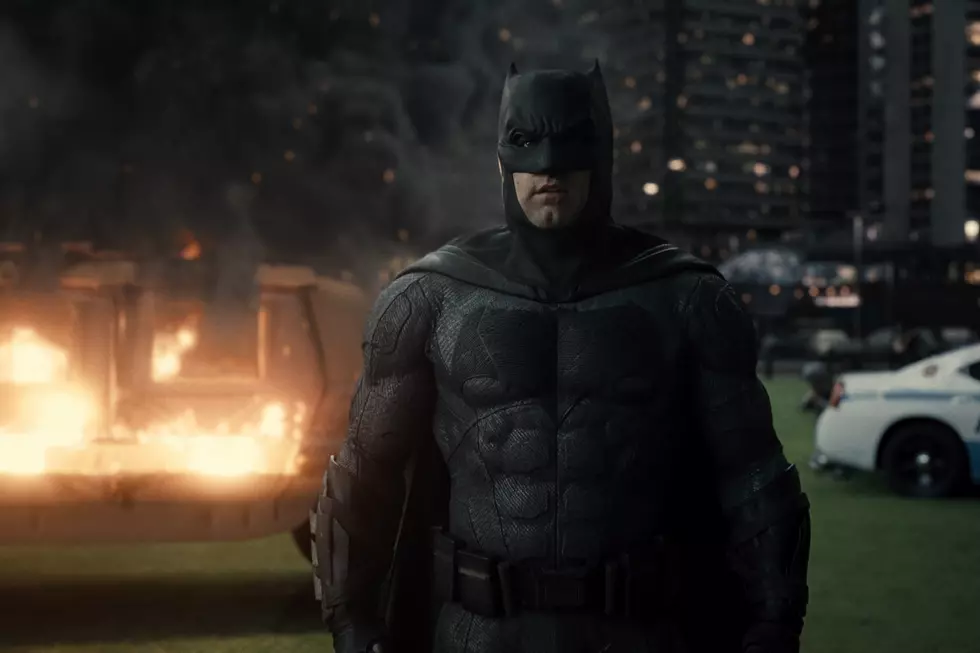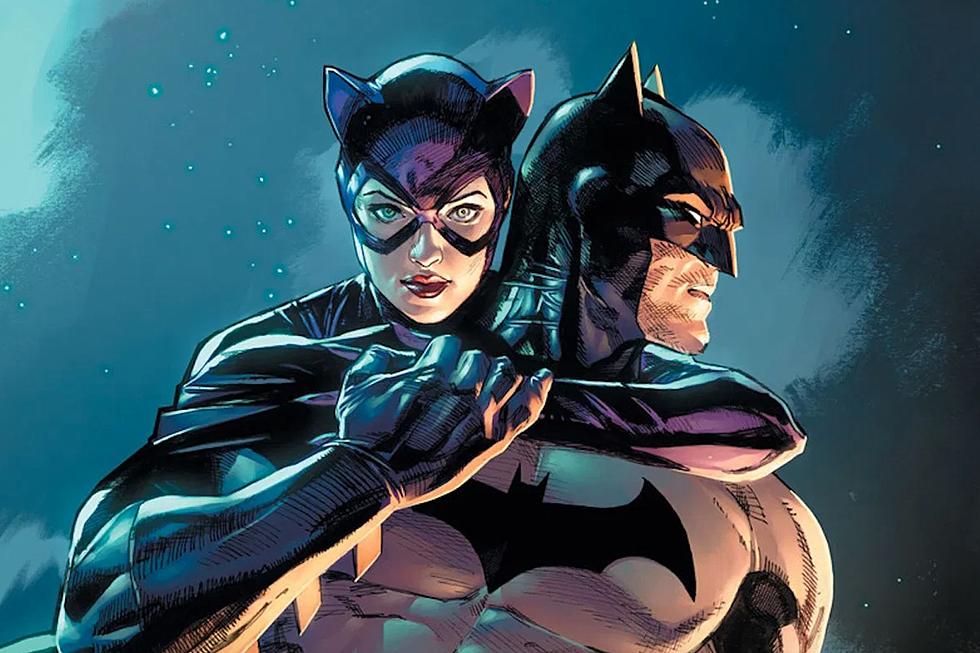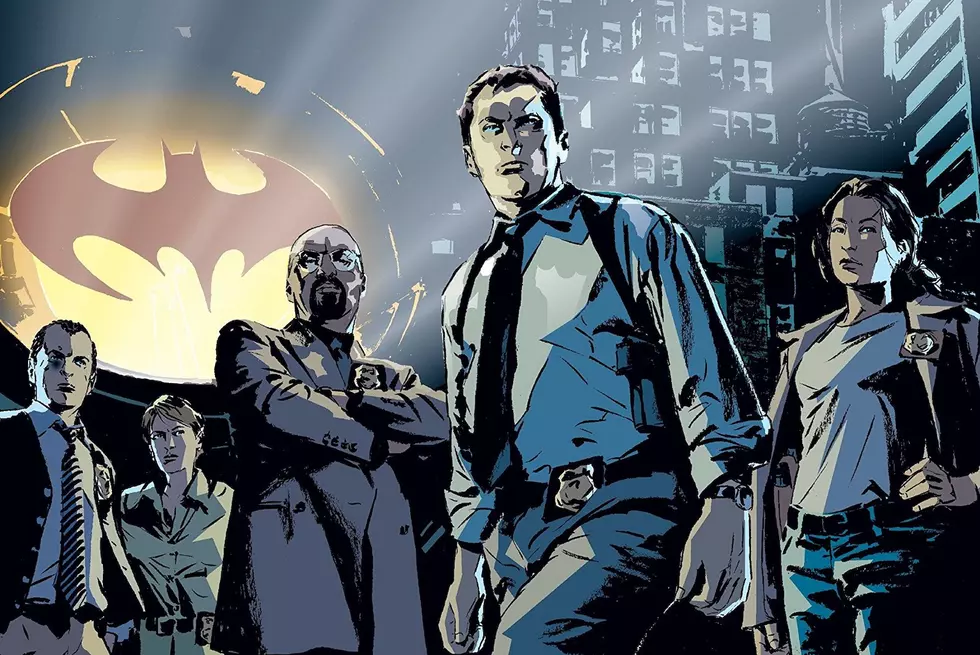
Ask Chris #246: Sympathy For The Joker
Q: I feel like The Joker is a very unsympathetic villain. Does he have any sympathetic qualities or moments? -- @DonNohVarr
A: Huh. Well, I've got some good news for you, Don: I'm pretty sure that you're not supposed to find the Joker to be a very sympathetic villain. I mean, he's literally an evil clown that murders people with knives and poison, and that may actually be the least sympathetic sequence of words in the entire English language.
But that actually does raise a pretty interesting question: If there's really nothing sympathetic about the Joker, then does that actually make him a better villain than characters that you do sympathize with? Unsurprisingly, I'd argue that it does, but let's see if we can't figure out why.
The best villains, after all --- the best characters --- are almost always the ones that have depth to their characters, the ones that have a core of humanity that makes them three-dimensional and gives them a motivation beyond just showing up to rob the Crossword Puzzle Factory or whatever.
That's just a basic storytelling rule, and an obvious one at that, but if you need proof, you don't need to look any further than the rest of Batman's Rogues Gallery. It's probably the best roster of villains in comics, and that's entirely because it's full of characters who do have that depth, who were built or evolved to reflect very specific ideas about Batman himself in a way that makes them very interesting.
I'm sure you've heard it all before, but it's true: Mr. Freeze has the family tragedy that has left him both literally and emotionally cold, save for the desire to try to fix things and put them back the way they were before. Two-Face is a man who is trying and failing to reconcile two halves of his personality. Poison Ivy is trying to stop what she sees as a crime that will cost a whole lot more lives than just muggers lurking in alleys. Catwoman is operating outside of a system that failed her, making her own rules to better her life and the lives of the people she cares about. The Penguin is funneling an Old Money reputation into an empire where he's in charge. Ra's al-Ghul is literally trying to save the world.
It's worth noting that most of those characterizations are relatively recent, starting to creep into the story in the '70s when the comics were making a concerted effort to get away from the gimmick crimes of the TV show, and then being refined through the '80s and '90s, but even the villains who never quite got past those gimmicks tend to have that depth added back in. I joke about the Riddler and the Crossword Museum a lot, but the idea of someone who deals with his own insecurity by constantly trying to prove he's smarter than the World's Greatest Detective is, while maybe not "sympathetic," certainly a little relatable.
Which, really, is the core of what makes those villains work. With a few exceptions, you don't really want to see them win --- Mr. Freeze being the obvious one where it probably wouldn't be so bad if he just figured out how to thaw out his wife and stop living in an icebox --- but you do recognize that they're People With Problems Who Have Gone Way Too Far. You want them stopped, but you, like Batman, understand that they need help more than anything else, which is why he always takes them back to a hospital, albeit one with terrible lighting and gargoyles on every available surface. There's a potential there to get better, and we can sympathize with that in the same way that we can sympathize with Batman overcoming his own tragedy.
Except the Joker.
It goes without saying that there have been a whole lot of versions of the Joker over the past 75 years, but from very early on, his motivation is pretty clear: He wants to hurt Batman. Maybe kill, maybe humiliate, maybe defeat to show the inherent weakness of trying to impose order on a chaotic world, but always hurt. That's what he wants and it's all he wants, it's all he exists to do, and really, that's kind of all there is to him. He's almost completely one-dimensional, built around a single idea, acting against exactly one foe, because to him, no one else matters.
In theory, that should make him a pretty boring villain, and it's even arguable that overexposure has done exactly that. But at the same time, it's pretty difficult to argue that he's not a great character and an amazing foil for Batman. And he accomplishes that without actually needing that sympathetic hook, without ever needing to be someone that the reader can relate to or sympathize with.
Except, of course, when he is. The elephant in the room here --- and the easy answer to your question --- is, as you might have already guessed, Alan Moore and Brian Bolland's The Killing Joke, a book that's entirely based around the premise that the Joker does have a sympathetic backstory.
And it is the most sympathetic backstory, to an almost hilarious extreme. He's not just a well-meaning shlub caught in a wrong-place, wrong-time situation where he's forced into crime; he's also just doing it to provide a better life for his wife and child, who --- because this is a superhero comic --- promptly die and render the entire thing pointless and futile.
It's an origin story that does exactly what the other villains' origins do --- it gives him a way to connect to and reflect Batman's own origin, built thematically around how each of the characters react to "one bad day." And that's an interesting idea, and one that laid the groundwork for some very interesting stories. I'm just not sure that it's a necessary one.
The Killing Joke was one of the cornerstones of the Batman mythos for a very long time, along with Year One and The Dark Knight Returns, but recent years have seen a lot of critical re-examination of the story and its impact on Batman in particular and the wider world of superhero comics in general.
A lot of that has definitely been rooted in the story's use of sexualized violence towards Barbara Gordon, something that's still being dealt with in the comics themselves and in the larger climate after thirty years and one and a half reboots, and that's absolutely the most important part of it.
But also, I think there's a small part of that backlash --- a backlash that includes Moore himself, who has seemed very sick of talking about that comic for at least fifteen of those thirty years --- that's based on its attempt at humanizing the Joker. Even shortly after it was published, it was quickly established that this was meant to be only a possible origin for the Joker, even though everyone accepted it as definitive for a long while.
Weirdly enough, the same thing actually happened to the Phantom Stranger, of all characters. There's an issue of Secret Origins that presents four different possibilities for how he works, and it was Moore and Joe Orlando's that ended up being treated as canon more often, up until the New 52. For the record, Mike W. Barr and Jim Aparo's was the best. Anyway.
The simple fact is that the Joker is a whole lot scarier when we don't know his origin. He represents the unknown, and the more we know about him, the less scary he is. And, in an interesting sort of way, that becomes his connection to Batman.
The thing is, from a character standpoint, Batman's the same way. I did an interview with former Detective Comics and Gotham Central writer Greg Rucka not too long ago where he talked about how Batman and the Joker are boring because you see so much of them, and how he prefers doing stories looking at them from the outside. Being in Batman's head lessens his impact on us as this mysterious figure --- and after decades of four or five stories about that dude every month, there's not a whole lot of mystery left --- and if it's lessened for us, then it's harder for us to understand how he could have that kind of impact on the other characters in the comic.
But with Batman, that's kind of unavoidable, if only because he's the protagonist of most of those four-or-five stories a month. He's the character that we're following, and frequently the character narrating the story. Even if we're seeing him through a different set of eyes this month, we still have years of knowledge about who that guy is, how he works, who his friends are, why he does what he does, all that stuff. We even have detailed diagrams of his headquarters and his equipment --- there's an entire book that's just about his car. There is nothing we don't know about him.
But that's because we're the readers. In the world of the comic, the crooks who encounter Batman shouldn't know that stuff. To them, he's just a dude who comes out of the shadows in his weird jet car and starts beating up crooks and de-poisoning the water supply.
And if you read those stories, that's exactly how it works --- the more the villains know about Batman, the less scared they are. It could be something as small as having been around long enough to know that he's not going to kill them, or it could be as big as Ra's al-Ghul, the character who actually does know everything we know and as a result isn't usually afraid of Batman at all, outside of his first appearance.
It even works with the Joker, too. He's not afraid of Batman in the slightest, and there's been a longstanding subtext --- subtext that became text in the most recent Joker story, "Endgame" --- that he knows Batman better than anyone.
The Joker, then, is to us what Batman is to the other villains. He's someone we're familiar with, someone we've seen a hundred times, but we don't know him. We don't know who he was or why he's doing what he's doing. We know what he wants and we see how he does it, but everything else is a mystery.
That's the idea that's rolled back around to prominence over the past decade or so, anyway. One of the things that Christopher Nolan's The Dark Knight did really well was presenting that same idea, in big and small ways. It's as small as the Joker wearing clothing that doesn't have any labels to identify it, and it's as big as the Joker giving multiple origin stories for his scars, none of which may actually be true. All he does in that movie is lie, which is an interesting and effective take on the character, because it makes him unpredictable and frightening even as he's manipulating this big, methodically arranged pattern.
You can see it in the current version of the character, too. One of the things that I really like about Scott Snyder, Greg Capullo, Danny Miki and FCO Plascencia's Batman: Zero Year --- aside from the fact that it's a Batman origin story that goes so far from Year One that it literally became a story about Batman fighting a bone monster in the middle of a hurricane --- is how it presents the Joker's origin. The Red Hood here isn't a mopey nobody who's pressganged into becoming a criminal, although that element is still part of it in how the larger Red Hood organization operates; he's already the Joker. Even before he goes into the chemicals, he's got that same attitude, that same hate-love for Batman, and that same smile, the only thing we ever see of his face.
By the time we meet him, he's already what he'll become in everything except the aesthetics. He was always the Joker, he just didn't have the hair.
And even that isn't written in stone. There's an epilogue in that first part of Zero Year about how the person that they thought was the Red Hood was found dead, killed in such a way that it's impossible to figure out when he was replaced by the man who became the Joker --- if the guy who dropped into the vat at A.C.E. chemical even did become the Joker. It's a safe bet to assume he did since that's, you know, how the Joker's origin story works, but we don't actually know, which makes things pretty interesting.
And it all works, because it's exactly what Batman does to everyone else. He presents this mysterious, single-minded, unstoppable face to the rest of the world, and the Joker presents that right back to him.
With all of that said, though, if you really want to see something that's sympathetic about the Joker, there's one place that you could try looking: Harley Quinn.
Please do not get me wrong: Most Harley stories present the Joker as anything but sympathetic. To say that he's abusive is putting it mildly, and I have a really hard time looking at their relationship as anything but a tragedy operating on a superheroic scale where Harley herself is (and should be) the only one who deserves sympathy. He's monstrous to her.
As a result, the last thing I want to do is say anything that will romanticize their relationship. That said, giving the Joker a sidekick --- even one that he most often uses only as a tool to get at Batman --- does change his dynamic a little bit, and gives him bits of humanity, feigned or otherwise, that you wouldn't see under any other circumstances, presenting it as a skewed version of romance. There are little bits of twisted affection that you see, like the scene above in The Animated Series where he seems to be genuinely happy with her for trying to kill him with a machine gun, a slapstick punchline that works a lot better without a lot of the context that would follow in later years.
The last time I wrote about Harley, a reader named Tara emailed me about this same idea, the question of whether the Joker has any actual affection for her or whether it's completely one-sided, and one of the things she pointed out was a passage in Batman #663.
You might remember that one as the issue with the weird prose story about the Joker by Grant Morrison, with the equally weird CG art from John Van Fleet, but if you missed it (or didn't go back to read it in the past eight years), it's all about the Joker preparing for his "rebirth" with the new personality that will carry him through Batman RIP. Harley's a big part of it, and there's a bit in there about how the Joker did love her, and wants to kill her in order to kill the last remaining bit of humanity in himself before he's reborn.
If that's the case, if the Joker is capable of some form of love --- for anyone other than Batman, I mean --- then that humanity is actually there, although I'd argue that it's a sort of humanity that makes him even less sympathetic, if possible.
Looking at a larger context, villains, like heroes, don't always fit into the same mold. There are some that only really become great once that extra dimension of empathy and recognition is added, the core conceit of books like Suicide Squad or Superior Foes of Spider-Man. There are others for whom adding that extra dimension and motivation, only makes them seem even more sinister, like Doctor Doom. And there are others, like Darkseid, the Joker, and even Cobra Commander, who don't need that element at all because they work in opposition to something else.
So if you don't really find the Joker all that sympathetic, I wouldn't worry. He is, and I cannot stress this enough, an evil clown who murders people with knives and poison.
Ask Chris art by Erica Henderson. If you’ve got a question you’d like to see Chris tackle in a future column, just send it to @theisb on Twitter with the hashtag #AskChris.
Check Out Some Strange and Surprising DC Comics Facts
You Think You Know Batman?
More From ComicsAlliance









